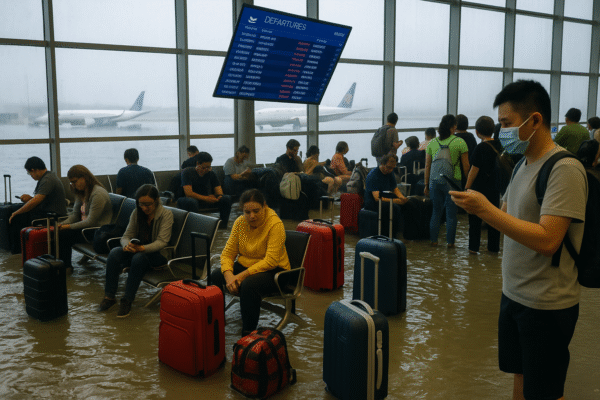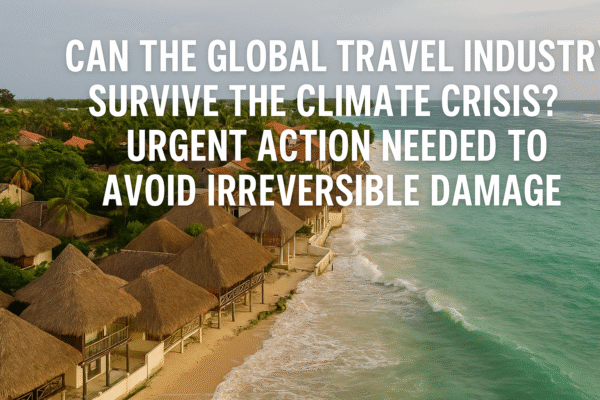The Global Travel Industry’s Tipping Point: Adapt or Collapse in the Face of Climate Change
As climate change accelerates into a full-scale global emergency, the travel and tourism industry finds itself under growing scrutiny. Once viewed as a gateway to global exploration and cultural exchange, the sector is now being challenged to transform—or risk becoming a primary contributor to environmental degradation.
In 2025, this dilemma has never been clearer. The post-pandemic tourism rebound has reignited travel enthusiasm, but also sparked alarming increases in carbon emissions. With international travel expected to reach 1.8 billion arrivals by 2030, according to the UN World Tourism Organization (UNWTO), stakeholders are asking: can global tourism continue to thrive without destroying the very destinations travelers seek to experience?
Time for an Industry Reckoning
Inaction is no longer an option. Leading scientists and climate authorities, including the Intergovernmental Panel on Climate Change (IPCC), have confirmed that global temperatures have already risen by 1.56°C above pre-industrial levels—surpassing the 1.5°C limit set by the Paris Agreement. This breach signals that climate tipping points are being triggered, from the melting of Greenland’s ice sheets to the potential collapse of the Atlantic Meridional Overturning Circulation (AMOC).
These changes present an existential threat to tourism. Iconic destinations—coastal paradises like the Maldives and winter hotspots in the Alps—are already experiencing flooding, coral bleaching, reduced snowfall, and ecosystem loss. Without aggressive mitigation strategies, the next decade could see widespread damage to both cultural heritage sites and biodiversity hubs.
Sustainability: From Buzzword to Business Imperative
More than just an ethical issue, sustainability is becoming a commercial priority. Surveys conducted by Expedia and Booking.com show that over 50% of travelers are now willing to pay more for environmentally responsible services. Many are demanding transparency on carbon footprints and climate actions from travel providers.
In fact, 92% of respondents in a 2023 global consumer survey said sustainability influenced their brand loyalty. For companies, this means that incorporating climate action is no longer just “good PR”—it’s a competitive necessity.
Technology as the Transformation Catalyst
While the road to climate-resilient tourism is steep, the tools are already here. Real-time carbon tracking, artificial intelligence in itinerary planning, and emissions-focused booking platforms are redefining how travel decisions are made.
Yet adoption remains uneven. Industry experts emphasize the need for universal standards to ensure that emissions data becomes as embedded in travel platforms as mobile compatibility or digital payment systems. Without this uniformity, sustainability efforts will remain fragmented and largely ineffective.
The Carbon Offset Conundrum
One of the most debated strategies—carbon offsetting—has faced criticism for its lack of transparency and effectiveness. Voluntary programs often suffer from low participation and limited oversight.
However, new mechanisms are reshaping the credibility of offsetting efforts. Initiatives like the Gold Standard, Verified Carbon Standard, and the UN Clean Development Mechanism (CDM) have introduced greater accountability, ensuring that offsets fund tangible environmental improvements such as reforestation, clean energy, and methane capture projects.
Still, experts agree: offsetting should be a bridge, not a crutch. The future lies in integrating automated, mandatory offsetting into the booking process. This alone could generate billions in funding for climate solutions if scaled globally.
Unified Industry Action: A Path Forward
For meaningful change, the travel industry must collaborate. Airlines, cruise lines, hotels, local governments, and tech platforms all share responsibility. Embedding carbon neutrality into core operations—rather than offering it as a checkout add-on—can reshape travel from the inside out.
Several countries are already leading the charge. France has banned short-haul domestic flights where train alternatives exist. The Netherlands is implementing tourism caps to protect local ecosystems. Meanwhile, eco-certified hotels and resorts are emerging across Asia, Africa, and the Americas as benchmarks for future development.
Tourism’s Expanding Carbon Footprint
According to a 2024 report by the UN Environment Programme (UNEP), the tourism sector contributes nearly 9% of global greenhouse gas emissions—more than the entire construction industry. These emissions span across air travel, food systems, accommodations, and infrastructure.
The challenge is systemic, requiring innovation not just in transport, but in every supply chain connected to tourism. This includes sourcing local ingredients, reducing waste, and building carbon-neutral facilities.
What’s at Stake?
If the travel industry fails to act, it could face strict penalties:
- Carbon taxes on high-emission travel activities
- Travel restrictions or quotas for non-essential tourism
- Operational bans on polluting services
More critically, the freedom to explore a rich and diverse planet may simply no longer exist. Destinations such as the Great Barrier Reef, Machu Picchu, and the Amazon rainforest could become inaccessible or permanently degraded.
Final Call: Reinvention or Ruin
The global travel industry stands at a defining moment. It must evolve into a leader of sustainable innovation—not a laggard clinging to outdated models.
The path forward is clear:
- Implement mandatory carbon offsets
- Standardize emissions tracking and reporting
- Embrace eco-innovation across all services
- Prioritize collaboration over competition
Above all, the industry must remember: protecting the planet isn’t just a responsibility—it’s a requirement for continued survival. Travelers of the future deserve more than just mobility; they deserve a world worth exploring.
For more travel news like this, keep reading Global Travel Wire

















